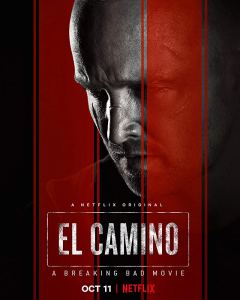El Camino: A Breaking Bad Movie (2019)
Premise: A sequel, of sorts, to Breaking Bad following Jesse Pinkman after the events captured in the finale of Breaking Bad. Jesse is now on the run, as a massive police manhunt for him is in operation.
Let’s get one thing out of the way right off the bat: El Camino: A Breaking Bad Movie start out at 5 stars for me when it was announced. I’ve had an affinity for the show almost since the beginning, and it was one of the first dramatic series where I would watch each episode immediately as it aired. So when a follow-up movie was announced, I was cautiously optimistic that it would be a welcome return to the characters and setting I loved so much. Knowing that Breaking Bad series creator Vince Gilligan would be writing and directing were absolute positives in my book as well.
Now that that’s taken care of, how is El Camino? The story told in its 2-hour runtime centers around Aaron Paul’s Jesse Pinkman, and his character’s aftermath from the series finale. For the uninitiated, Jesse was the (mostly) reluctant sidekick to Bryan Cranston’s Walter White, the crystal meth kingpin of Albuquerque. When we last saw them, Walt had died in a shootout while freeing Jesse from the captivity of a bunch of neo-Nazis (yes, it sounds insane, but I promise it’s incredible television). El Camino picks up immediately where Breaking Bad left off, with Jesse evading the police in the titular vehicle. From there, the plot mostly revolves around his search for his stashed-away money and his attempts to leave town for a fresh start. In-between, the film flashes back to his life in captivity under Todd (Jesse Plemons). Paul has never been better or more magnetic in his career as Jesse Pinkman, and El Camino is another showcase for his abilities. Jesse has never been more broken or desperate, and Aaron Paul conveys it all with the same raw empathy he showed for 5 seasons (6 if you count season 5 part 2 separately) and earned him 3 Emmy awards. This is a man who just wants to be free and happy but can’t seem to escape the criminal underworld that only wants to destroy him.
Now that we’ve entered the age of reboots, sequels, and prequels, the announcement of El Camino was mostly met with measured excitement. The finale ended so perfectly with the right amount of closure on almost all fronts that a follow-up threatened to tarnish Breaking Bad’s legacy. Would the movie be accessible to anyone that’s not familiar with the show? How much would be filled with callbacks and cameos from the series’ characters? The answer to the former is a little unclear (since, as previously established, this reviewer is already deep in the weeds of this world, I can’t say with absolute clarity). Even though an understanding of the larger story certainly helps, the characters are so richly drawn and the stakes are so clear that the movie definitely has broad appeal on a basic human level.
As for the fan service element of El Camino, a certain amount is surely unavoidable- and Gilligan’s script doesn’t merely shoehorn it in- but some scenes work better than others in terms of serving the overall function of the plot. In particular, Cranston and Paul get one final scene together where the two talk about their post meth-dealing plans and their outlooks on the rest of their lives. While the writing in the scene is top-notch and it is always great to see the chemistry between them (and to see how far Pinkman as a character has come since those early days), it slows down the momentum and underlines the themes of the film a little too neatly. Everything else that fans have come to expect from Gilligan’s work on Breaking Bad – from the breathtaking cinematography to the slow but deliberate pacing right down to the seemingly random POV shots – can be found throughout this film. Was El Camino absolutely necessary to make? The film can easily be described simply as a 2-hour episode of the show, but strip away the larger Breaking Bad mythology and what you’re left with is a simple but empathetic look at how much one person is willing to sacrifice for a fresh start and a little peace of mind.
Find more of Ben’s columns here.
Follow Ben on Letterboxd



